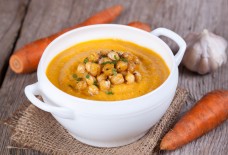Turba Farms Leads the Way for Lebanese Food Security
By Drew Jackson / Contributing Writer Arab America
“Turba” the Arabic word for soil is the name of a new farm in Zahle, Lebanon, aimed at combatting food insecurity and soil death in new regenerative farming project on behalf of the NGO “Farms Not Arms.”
This female-led regeneration project places soil health at the center of environmental issues mass agriculture is facing. This farming system, based on low-tech hydroponics and crop diversity, aims to ensure that soil can yield maximum crop today, and continue to be used for generations to come.
“Almost 80 percent of our topsoil is dead worldwide, and it scares me. I don’t know how it doesn’t scare other people,” Erica Accari, Turba Farmer stated to Al Jazeera.
Accari, a Lebanese native helped to co-found Turba Farms with Farms Not Arms Managing Director Jehane Akiki. The sustainable farm in Zahle is meant to serve as a pilot program of the model of sustainable agriculture Farms Not Arms wants to push for other nations and farmers to adopt.
The goal of Farms Not Arms’ farms are in their design. They aim to create a closed-loop system by using different agricultural designs that works to minimize waste outputs and is regenerative by design.
Additionally, these farms aim to maximize water usage and recycling, incorporating low-tech components to acquire, store, and recycle water into different crop products. The real magic is in the soil regeneration and diversification components of the project. Their tactic of multi-level tree intercropping allows plants to work together in order to strengthen the soil. Not only does this tactic strengthen the health of the soil, it allows farmers working within this model to grow a diverse group of crops to cover human dietary needs. This goal is becoming increasingly important especially in Lebanon among their current economic crisis.
Lebanon is in the midst of what the World Bank ranks as one of the worst economic collapses since the 1800s, and with it are reeling from issues of food insecurity.
Since 2019 Lebanon’s pound has plummeted in value by at least 90% causing food prices to shoot up to an average of 400% their original cost. These, mixed with a public debt of 95 billion USD (the largest of any nation in terms of debt to GDP ratio), has forced millions below the poverty line and has plagued many with food insecurity as a result.
Lebanon has worked to combat food insecurity via the initiative of “Zari’et Albi” which translates to “to the plant of my heart.” This initiative encourages Lebanese citizens to sprout gardens wherever they can, leading to many rooftop and balcony gardens in urban areas. The goal of the initiative is to help citizens (of which 40% are unemployed as a result of the economic crisis) become self-sufficient and feed themselves.
With the unemployment and economic crisis, the agriculture sector is one that Lebanon should invest into heavily. In 2008, agriculture accounted for only 4.5% of the nation’s GDP, and in 2018 that fell to a 2.9% constitution of the GDP.
Agriculture is an incredibly important sector for investment beyond the obvious food security aspect. If agriculture is heavily invested in, it will decrease Lebanon’s reliance on imports and foreign currencies, and additionally will lead to job creation in terms of processing, distribution, and marketing. Agriculture however, unfortunately contributes to a huge environmental footprint, contributing to soil deterioration among other environmental issues such as erosion. What is really needed is large-scale sustainable agriculture, which harvests maximum crop yields while keeping the soil healthy enough for future generations to use.
Turba aims to fill this gap left in the need for agriculture. With the regenerative practices of Farms Not Arms being put to practice in this pilot program, Lebanon may be able to lead the way towards food security and agricultural sustainability, helping to pull itself out of the poor economic crisis it finds itself in today.
Check out Arab America’s blog here!
Information for this article was sourced from Farms Not Arms & AlJazeera









